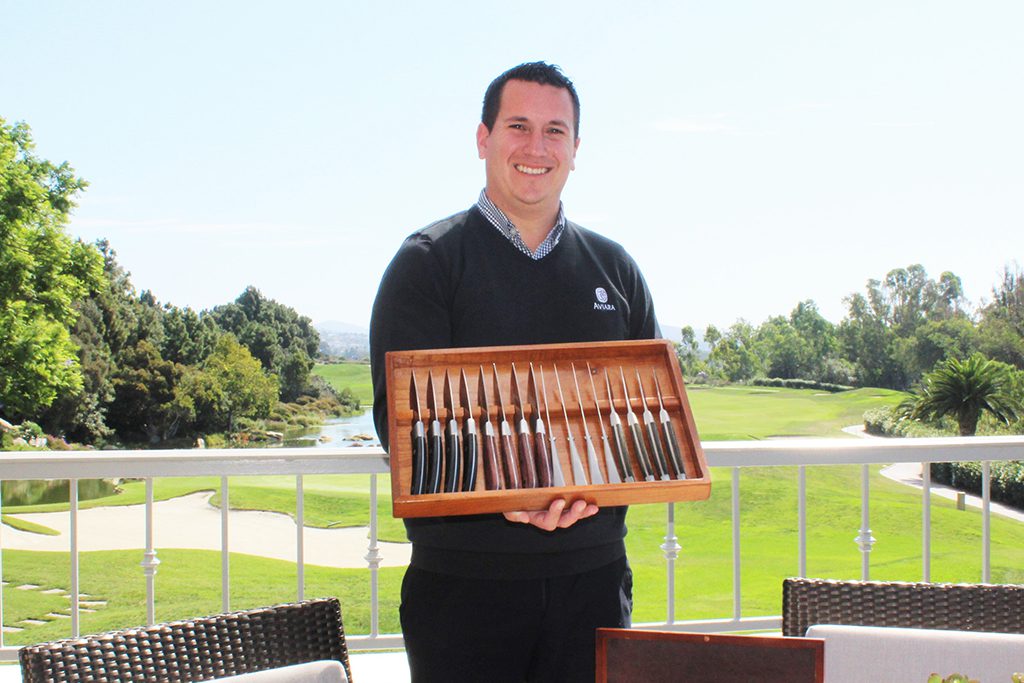Park Hyatt's Blade Runner: Knife Concierge Offers Cutting-Edge Service

Skift Take
For the past five years, The Argyle Steakhouse in San Diego's Park Hyatt Aviara has added “steak knife concierge” into the waitstaff job description.
It all started, according to Nathan Brown, director of food and beverage for Park Hyatt Aviara, when his former boss, Brian Loughnane, reflected on his Irish roots. Loughnane, now corporate director of food and beverage for Hyatt, comes from a long line of Irish butchers. Because of that, according to Brown, “Meat for Brian is more than a meal. It’s an art form.” He continued, “So we started talking about the dining experience and how it could tie into the Park Hyatt philosophy that luxury is personal.” Since steak, from the type of cut to the doneness of the meat, is tailored to each customer, why not the choice of the steak knife as well?
Brown, who at the time was the general manager of The Argyle Steakhouse, took a stab at bringing the program into existence. The 33-year-old Brown has spent his entire career in hospitality with Hyatt. After attending college in his home state of Oregon, the communications major moved to Los Angeles with dreams of pursuing a career in television production. But after a few years working on the set of The Singing Bee, he realized that the field wasn’t the bee’s knees.
So he took a steadier gig as a breakfast server at Andaz West Hollywood. That led to jobs of increasing responsibility, to the point where he worked his way up over eight years to become a food and beverage director. “Once I got to Hyatt,” Brown said, “I realized I could be a part of something bigger. In some ways, the waiting job was similar to what I was doing in television production. It’s putting on a show. I fell in love.”
A few years into the career, he moved to San Diego, where he moved into the management side of food and beverage. While he served as general manager of The Argyle Steakhouse, he also took on the role of master steak knife concierge in 2016.
Cutlery Culture
To prepare for the role, Brown dug deep into the history and nuances of knife-making. “I was intrigued by the history,” said Brown. “As I learned about it, what started fascinating me is when you look at the history of steelwork and the samurai sword makers and blacksmiths, it’s no less artwork to make a knife.” But knife-making is also a craft — the utensil has to have utility. “Tendons and fibers hold juiciness. So, cutting through tendons, you need a clean cut, or it will change the profile of your steak. You need a blade that holds sharpness, is balanced in the handle, and makes pristine cuts to result in less tearing and more precise juicy bites.”
Brown also had to learn a bit about knife psychology. “Just as the choice of steak is very personal to people, so is the choice of knife. Each type of knife has its own personality. And you can figure out the personality type of a person by the knife they choose.” In his experience, for example, he has discovered that women tend to be more logical about their choice of knife, often comparing the feel of several, while most men make decisions based on “what they feel in their gut.”
THe Art of Dining
Guests are presented with an array of knives that are displayed on a custom wooden tray. There are usually five to seven from which to choose, varying in size, weight, type of blade and design. The most popular choice is the Hammer Stahl, also known as The Argyle Knife. This knife is crafted first in Germany. Next it goes to China, where the process of applying the pakkawood handles are done by hand.
While Brown was the first steak knife concierge, he now trains his entire waitstaff. He compared it to a traditional concierge system at a hotel, where there is an entire team. They are taught the history of each knife, the material it's made of, and the ergonomics.
While each waiter on a shift makes recommendations, one assigned person every shift will round up the trays from previous knives (which are locked in a cabinet — these knives costs $50 to $150 a pop. They will clean out the tray, replace missing knives, tighten screws, condition the wooden knives, and polish the mother-of-pearl handles to make everything looks sharp. If blades need actual sharpening, a freelance sharpener handles the task.
The concept of having a choice of knives intrigues guests. "The art of dining is in the nuance. Having this table-side service delights guests and creates an experience that will leave a lasting personalized memory," said Brown. “We like to think we have ruined the dining experience for those going to the local Ruth's Chris.”




